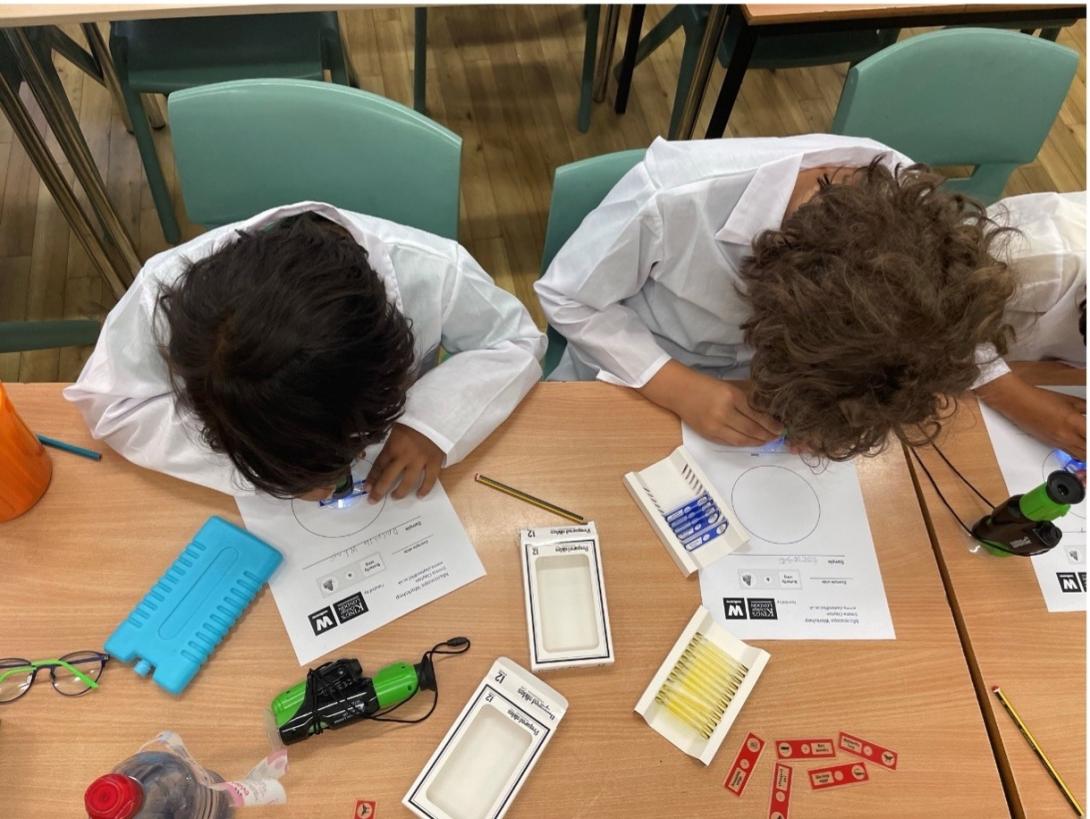Ahead of International Day of Women and Girls in Science, we spoke to Dr Emma Clayton (UK DRI at King’s), one of the UK DRI’s newest Emerging Leaders. She told us about how she first became inspired to pursue science, her current research into amyotrophic lateral sclerosis and frontotemporal dementia, and her passion for public engagement.
A NASA internship
Dr Clayton’s interest in research was first piqued when she was selected for a highly competitive internship at NASA’s Kennedy Space Center, after completing her undergraduate degree. Despite having a genetics degree, she was given an ecology internship, working with a group assigned to look after the wildlife sanctuary that surrounds the centre. The work involved monitoring and tracking the species at the sanctuary.
“The internship really solidified my desire to be in a lab, which completely took me by surprise,” she says. “But I found I enjoyed the mental challenge of molecular work, and it suddenly became clear to me that that’s where I wanted to be working.”
But it wasn’t until her second postdoc position that Dr Clayton felt committed to pursuing a career in academia. She was working with Prof Adrian Isaacs (now a Group Leader at the UK DRI at UCL) at the time and recalls the moment that everything clicked for her.
“Adrian is incredibly passionate about this idea of solving the puzzle, and when I was in his lab, I really felt that spark ignite in me. I discovered this idea of researching neurodegenerative diseases, this currently unsolved puzzle, and how all my skills in synaptic biology and membrane trafficking could come together and be applied to these conditions.”
Transformative grant funding
Now an Emerging Leader at the UK DRI at King’s, Dr Clayton’s research focuses on dysfunction in the synthesis and breakdown of proteins at synapses – the connections between neurons – as a driver of amyotrophic lateral sclerosis (ALS) and frontotemporal dementia (FTD). In 2021, Dr Clayton was awarded a UK DRI Pilot Award, for a project aiming to produce tools to investigate synapse dysfunction in FTD and ALS.
“The pilot funding was so transformative for me in many ways,” she says. “It’s been incredible. I used the funding to employ a technician to do the project, and that freed me up to begin to plan other things. It really allowed me to do a lot of creative thinking and carve a scientific niche for myself. And that was all facilitated directly by the UK DRI pilot project.”
Since her pilot project, and based on data produced from it, Dr Clayton has been awarded two PhD studentships from the MND Association and Alzheimer’s Society, one of which is being undertaken by the technician Dr Clayton employed for her pilot project.
The pilot project also enabled Dr Clayton to successfully apply for an Alzheimer’s Research UK (ARUK) Senior Research Fellowship, which led to her being appointed a UK DRI Emerging Leader.
“I’m really proud to be named an Emerging Leader at the UK DRI at King’s, particularly because of the team there. They’re incredibly supportive, and we’ve had two exciting and dynamic Group Leaders join this year. I think that the weight of expertise they're building at King's is very exciting, and we're beginning to see novel therapeutics trickle through. The proof of principle is there that we may be able to target these diseases early on. At the UK DRI it feels like we’re at this tipping point, gathering momentum to really push through and begin to have bona fide therapeutics which will make a difference to people’s lives. I think that’s why we’re all in this.”
At the UK DRI it feels like we’re at this tipping point, gathering momentum to really push through and begin to have bona fide therapeutics which will make a difference to people’s lives.Dr Emma ClaytonUK DRI at King's
Journey to independence
Becoming an Emerging Leader marked the start of Dr Clayton’s independent research career, but her journey up until that point wasn’t without obstacles. She reflects on the unique challenges women in academia face.
“The transition to independence is incredibly difficult, irrespective of being male or female. But what's particularly difficult for women is that it comes at a time in your life where you're making huge decisions about, for example, whether you want to have children. During my postdocs I had two kids, and I remember during my second maternity leave I was putting in the costings for a fellowship, a day or two after I’d given birth. It can be very difficult.”
Although she wasn’t successful in that application, Dr Clayton says the experience helped her in her application for her current fellowship. She considers representation, and the visibility of women in senior positions in science, to be key.
“I’m proud to represent ARUK as one of their research fellows. Being awarded this fellowship was absolutely the highlight of my career so far, because it is validation that you’re doing something right. And charity funding is so valuable, I am really appreciative of everyone who donates.
I probably wouldn’t have gone for a senior fellowship had I not seen successful female senior fellows. Seeing people like Tammaryn Lashley, Selina Wray and Frances Wiseman all attain senior ARUK fellowships while I was a postdoc, made me realise that was actually a pathway that was possible for me too.”
Inspiring the next generation
Alongside her science, Dr Clayton also has a passion for public engagement, and she hosts regular events in schools, aiming to get kids excited about science from a young age. The idea was first born during the pandemic, when she was home schooling her three year old whilst also looking after her six month old.
“Living in London with a tiny garden, we were so sick of the local park!” she says. “The school suggested an interesting activity to do with the kids would be to raise butterflies. They gave us a link for the website where you could buy the caterpillars. We ordered some and it was just the most interesting thing, because they change on a daily basis.”
A true scientist, Dr Clayton bought a field microscope so she and her kids could examine the caterpillars more closely as they metamorphosised.
“I loved it, the kids loved it, the baby tried to eat a butterfly. So it turned into this idea of creating a microscopy workshop where other kids could experience that. And it was really popular. I've done it from nursery age through to year six, and everybody gets something out of it.”

Children from nursery age to year six have attended the workshops
The project grew from a workshop in her local school, to several in the community surrounding her lab at the UK DRI at King’s, with funding from The Biochemical Society and King's Public Engagement Fund. Dr Clayton has also volunteered for ARUK, speaking to the public about science at events such as New Scientist Live.
“For me, it's not just about being in the lab,” she says. “There's the other side of being a scientist that is communicating your work to people. It’s a more holistic approach. I’m trying to enthuse kids, to hook them at a young age and show that science is exciting.”
To find out more about Dr Clayton’s research, visit her UK DRI profile.
Article published: 9 February 2024
Image credits: Shutterstock/Andrii Vodolazhskyi, Dr Emma Clayton
